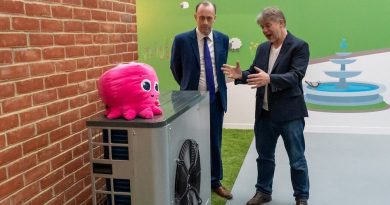104,000 panel solar farm set to power The University of Manchester

The University of Manchester has signed a landmark new deal that will see up to 65% of its electricity demand supplied through a brand-new renewables project.
In a major move towards achieving its 2038 zero carbon ambitions, the University has partnered with leading UK clean energy company Enviromena to buy electricity generated from its brand-new solar farm based in Medebridge, Essex.
Once complete, Medebridge Solar Farm will comprise 104,000 solar panels across 175 acres of low-grade agricultural land, the equivalent of around 70 football pitches.
The site will also create a significant biodiversity net gain. With enhancements to the existing hedgerows and planting of native grassland and wildflower meadow beneath and around the solar arrays, the site will encourage nesting opportunities for wildlife and improved habitat connectivity.
The contract that secures this investment, known as a Corporate Power Purchase Agreement (cPPA), commits the University to purchase 80% of Medebridge’s total annual generation capacity (58 GWh) for the next decade, reducing University carbon emissions by 12,000 t/co2 every year – enough to power 21,000 homes.
Lee Barlow, Finance & Administration Manager, and Project Lead at The University of Manchester, said: “After nearly three years of rigorous procurement and negotiations, we are proud to announce this landmark agreement, which reinforces our commitment to sustainability whilst delivering best value to our students and stakeholders, in the form of price certainty and supply stability.
“The journey has been marked by unprecedented challenges in the energy and renewables sector, first with the 2022 energy crisis, and later complicated by geopolitical events in Eastern Europe. Securing this 10-year cPPA despite such adversity is a huge accomplishment and holds special significance as we celebrate the University’s bicentennial year.”
Carly McLachlan, Professor Climate and Energy Policy and Academic Lead for Carbon at The University of Manchester, added: “The really important thing for us in developing this relationship was that our commitment would add new renewable energy capacity to the UK electricity system. Through our long-term purchasing commitment, we have played a key role in bringing this development forward – maximising the positive impact of our purchasing power.”
This milestone achievement was made possible through the collaborative efforts of a multidisciplinary implementation team from the University, complemented by the expertise of its energy broker, Inspired PLC, and Eversheds Sutherland acting as external legal counsel.
Enviromena develops, builds, owns and operates renewable energy assets and currently manages over 300MW of renewables projects. In addition, Enviromena is currently working on a 3GW+ pipeline of renewable energy projects in the UK and Italy that will significantly decarbonise electricity networks, reduce emissions and support the global drive towards net zero.
Lee Adams, Enviromena’s Chief Commercial Officer, said: “Enviromena is leading the charge towards a world powered by clean energy and our teams are delivering high volume projects that make a massive contribution to lowering carbon emissions. This significant partnership with The University of Manchester demonstrates the shared commitment between ourselves and an influential, large-scale organisation, which, at the time it celebrates its 200-year anniversary, is taking steps towards reducing its carbon footprint through the technologies of tomorrow for a cleaner future energy supply.”
Chris Marsh, Enviromena’s Chief Executive Officer, added: “We’re delighted to partner with the University to support their zero carbon ambitions. In addition to reducing the University’s carbon emissions over the next 10 years, the site itself will benefit the local habitat over its useful life until mid-2060.”
Construction of Medebridge commenced in April 2024, with energisation expected in autumn 2025.
The University has set ambitious goals to reduce its environmental impact, in line with its core goal of social responsibility. In 2022 it ended investments in coal, oil and gas and reduced the carbon intensity of its investments by 37%.
All degree programmes are kite-marked against the United Nations Sustainable Development Goals (SDGs) and the University is rated top in the UK and Europe and second in the world in the Times Higher Education Impact Rankings global performance table (2023). Manchester also top in the UK and Europe and third in the world in the independent QS World University Sustainability Rankings (2024)
The Sustainable Futures research platform brings together the unique depth and breadth of internationally leading research at The University of Manchester and builds on the University’s track record of successful interdisciplinary working, to produce integrated and truly sustainable solutions to urgent environmental challenges. This includes the Tyndall Centre for Climate Change, which helped create the University’s Zero Carbon Goal.





